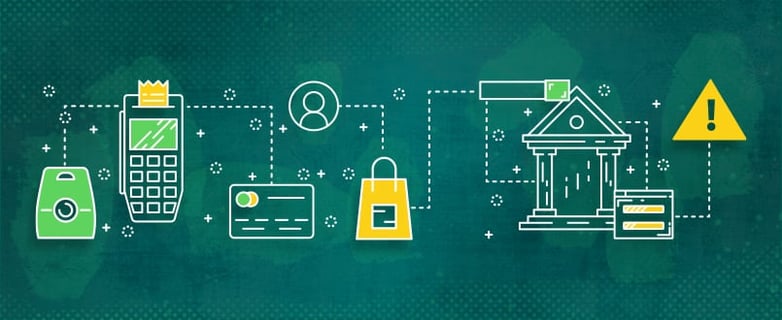
Chargeback Alerts: A Guide to Verifi Alerts (CDRN) & Ethoca Alerts
By Brian Radford on Jun 22, 2020
Merchants cannot merely overlook their chargebacks as they can become excessive. An overlooked chargeback problem can lead to difficulties with their payment process and the card networks, including MID closure and being blacklisted by the card networks. It is critical for merchants to keep their chargeback to transaction ratio well below 1% to avoid these problems. With that said, the good news is that there are ways to resolve many directly with the customer.
When merchants take into consideration the total cost of a chargeback is up to 3 times the transaction amount, critically impacting their bottom line; another great reason to be proactive about stopping chargebacks is the cost. All of which shows a chargeback problem left to grow out of control can quickly devastate a merchant's revenues.
Merchants of every size and industry must factor chargeback prevention into their plans. For merchants in high-risk sectors or those carrying multiple merchant accounts, effective chargeback management is especially critical. Fortunately, merchants have help. The major card networks have partnerships with third-party providers Verifi and Ethoca to offer chargeback alert services, providing merchants the opportunity to resolve disputes before they become chargebacks.
Chargeback alert providers charge merchants a fee for each alert, but when used properly, they can make a huge difference. We'll take a closer look at the two main chargeback prevention alert networks: Verifi CDRN and Ethoca.
Verifi Alerts (CDRN)
Verifi provides payment protection and management solutions to e-commerce companies. In 2019, they were acquired by Visa.
Verifi CDRN—or Cardholder Dispute Resolution Network—functions as an early warning system for chargebacks. Participating merchants receive alerts from CDRN when a cardholder attempts to file a dispute with their issuing bank. The merchant then has a brief window of time during which the dispute process is paused, and if they can resolve the issue behind the dispute, the chargeback can be avoided entirely. An immediate refund is usually the most effective response. Merchants can also do nothing in response to the alert and accept the chargeback if they believe it is illegitimate or fraudulent if they wish to fight it via representment. Merchants should use this option sparingly, limiting this to high dollar transactions as they still pay for the alert and the chargeback fee.
When a merchant resolves a dispute by responding to a chargeback alert, their chargeback rate is unaffected, and they incur no chargeback fees from their processor. Merchants do have to pay Verifi a fee for each alert, whether they respond to it or not. Compared to the true cost and danger of chargebacks, Verifi's fees can be a small price to pay.
Ethoca Alerts
Ethoca is a global provider of technologies that help e-commerce merchants prevent fraud, and stop chargebacks. They are based in Toronto, and MasterCard acquired them in 2019.
Ethoca alerts also work by interrupting the progression of the chargeback process to notify merchants that a cardholder is disputing one of their transactions. By pausing the dispute process the moment it begins with the issuing bank, the merchant can resolve it without involving their acquiring bank, thus avoiding fees and hits to their chargeback ratio.
Alerts empower the merchant to choose their preferred outcome for a newly raised dispute. To avoid the chargeback process and preserve good relations with the customer, an immediate refund is usually the best choice. Merchants who believe they are seeing fraudulent or invalid disputes and don't want to reward it with a refund can reject the alert, allowing it to become a chargeback and engage in the dispute process. Again, this option should be limited to rare cases with high dollar transactions, avoiding unnecessary costs to the bottom line.
Like Verifi, Ethoca charges merchants a fee for every alert they send, regardless of how the merchant responds to it. Alert fees can be costly, but the cost of having your merchant accounts shut down due to an excessive chargeback ratio is far worse.
A Side-by-Side Comparison
Verifi and Ethoca both work with an extensive network of issuing banks to provide the best possible coverage for chargeback alerts. Merchants cannot get a chargeback alert from an issuer that does not participate in either of these networks. Many banks work with both, but there are some critical differences in coverage:
-
Verifi covers more issuing banks in the United States and is in the process of expanding their network
-
Ethoca's network includes more banks in the EU, Asia, and Canada.
For both networks, the alert and response process functions quite similarly. Merchants must respond to an alert within 24 to 72 hours of receiving it, or the window of opportunity will close, and the dispute will turn into a chargeback. Either way, the alert network will charge the merchant a fee of about $40 each time an alert is sent.
Merchants who want to maximize alert coverage by using both providers may have a problem with duplicate alerts (and double the fees) when a dispute is initiated at a bank that belongs to both networks. To avoid overpaying for redundant alerts, merchants must find a balance between cost and coverage that sufficiently addresses their specific chargeback issues.
Protecting Merchant Accounts
The only way to accept credit and debit card payments from your customers is with a merchant account from an acquiring bank. Chargeback activity is carefully monitored by both the acquirers and the card networks; merchants who carry excessive chargeback rates (usually defined as 1%) are quickly identified.
These merchants may be charged higher fees, placed on chargeback reduction programs overseen by the card networks, or shunted off to "high risk" payment processors that charge exorbitant rates. If a merchant maintains an excessive chargeback rate for too long, they may end up on the Terminated Merchant File, a card network blacklist, which prevents the merchant from opening new merchant accounts for up to five years.
Unmanaged chargebacks can threaten a merchant's survival. Chargeback alert services come with a cost of $40 per alert. However, they can reduce a merchant's chargeback rate by as much as 20%. If a merchant has 1% chargeback rate, reducing chargebacks by 20%, which is enough to keep their accounts in good standing with their processor and card networks.
The thing to remember about chargeback alerts is that they aren't a passive solution. Merchants must actively monitor their alert systems and respond to them in real-time or miss their window of opportunity. If you're going to pay for alerts, you need to have staff available to respond within the 24 to 48-hour timeframes, or you could end up wasting your money on unanswered alerts. Some merchants deal with this by outsourcing this process to a chargeback management company.
Using a Chargeback Alerts Provider
Staying on top of chargeback alerts and the other dispute processes that require attention can be a lot for a merchant to take on. There's a lot to know about fighting chargebacks effectively, and most merchants don't have the time or resources to become experts.
One way to get the best value out of chargeback alerts is to work with a chargeback management company that is also an authorized reseller of Verifi and Ethoca alert services. You get a dedicated team that understands both networks, who will work to respond to all your chargeback alerts on time.
When you're using multiple merchant accounts, it can also make life much easier when you can monitor and manage all of your chargebacks, accounts, and alerts from a single intuitive dashboard. A convenient dashboard is a much better alternative to logging into multiple portals and managing chargebacks separately.
To really prevent chargebacks, you need real-time visibility into your chargeback activity and reliable metrics for measuring the effectiveness of your chargeback management efforts. The true measure of any chargeback defense strategy is whether your revenues are going up, and your chargeback rate is going down, the right solution will always let you know exactly where things stand.
MidMetrics is the solution that provides all of this: a full suite of our proprietary chargeback management tools, including Management Dashboards, In-Depth Analytics Tools, and On-Demand Reports. For one all-inclusive price, MidMetrics provides you with a powerful and flexible platform for shrinking your chargeback rate, growing your revenue, and tracking the health of all your merchant accounts.
Want to see MidMetrics in action? Book a demo with one of our chargeback specialists today.
Putting together a chargeback prevention strategy that affords sufficient protection can be daunting, as many different issues can lead to chargebacks. Not sure where to begin? We've got answers for you in this helpful guide, Chargeback Prevention: A Recipe for Healthy Merchant Accounts.



